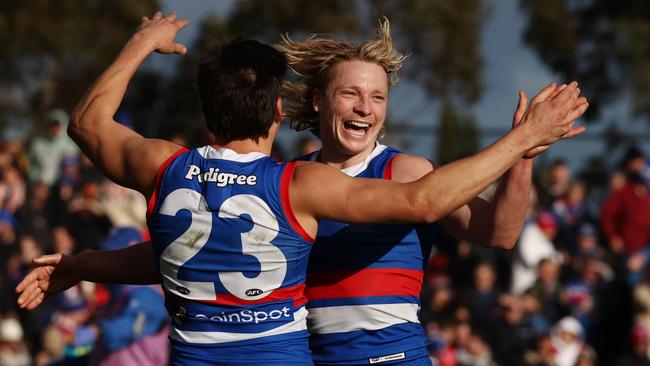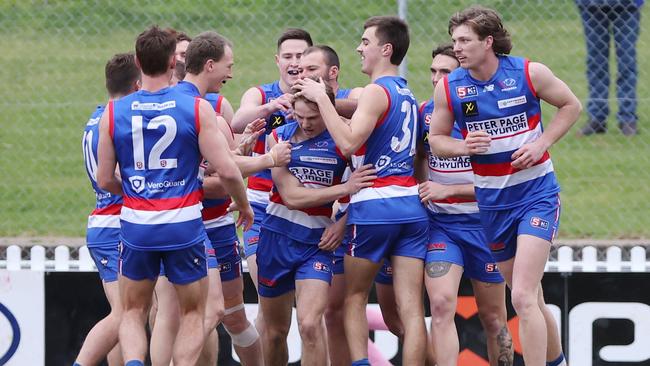Mystery CoinSpot founder Russell Wilson reaps bumper $700m dividend as cryptocurrency business posts huge profits
The cryptocurrency exchange and broker business is suddenly one of Australia’s most profitable private companies, and its founder and small number of shareholders have “big plans”.

Little-known 42-year-old Melbourne cryptocurrency entrepreneur Russell Wilson has reaped most of a huge $700m dividends paid to shareholders of cryptocurrency firm CoinSpot in just two years.
Cryptocurrency exchange and broking private company CoinSpot, which sponsors AFL club Western Bulldogs, has made big profits that have mostly been paid out via dividends to several members of the Wilson family, headed by Russell Wilson, since 2021.
Documents lodged with the corporate regulator over the weekend and obtained by The Australian show CoinSpot has emerged from corporate obscurity to be one of Australia’s most profitable private companies – and potentially put Wilson on a path towards a position on The List – Australia’s Richest 250.

CoinSpot parent company Casey Block Services recorded a $292m net profit from $503m revenue for the 2022 financial year, a year after it made a $334m
The results were recorded at the height of the cryptocurrency peak, though CoinSpot says it has more than 2.5m customers who are able to buy, sell or swap 400 digital currencies on its website and app.
A total dividend of $336.05m was paid for the 2021 financial year, then $282m for 2022 followed by a further $81m dividend declared after June 30 last year.
The dividends paid out by CoinSpot are more than just about all companies owned by Australia’s most prominent billionaires and other members of the Richest 250.
CoinSpot was approached by The Australian for comment.
Wilson started CoinSpot in 2013 according to the company’s website, but he has little presence online besides writing on blog on his company’s website in its earlier days. There are also virtually no photos of the CoinSpot founder.
His business reportedly doubled its customer numbers in 2021, amid surging demand and the start of its Bulldogs sponsorship.
“Seeing the CoinSpot brand on the back of the jumpers is an awesome feeling for us and the cryptocurrency space as a whole,” Wilson said when the deal was announced.
“Much like the Western Bulldogs’ recent ongoing success, CoinSpot is continuing to kick goals and has big plans for the future.”

The Bulldogs and CoinSpot announced in late June they were extending the sponsorship deal for another three years.
CoinSpot’s financial accounts showed it had $171m revenue derived from transaction fees last year, and another $287m income from cryptocurrency “trade facilitation”. It also had $42m income from staking rewards income.
Wilson is the sole director of the CoinSpot parent company Casey Block Services, which is 80 per cent owned by other potential fellow family members with the same surname.
The biggest shareholder of Casey Block Services is a private company called Wilson Business Equity Pty Ltd, which owns 77 per cent – the same figure Wilson owned of Casey Block Services until his share was transferred to Wilson Business Equity in June 2019, according to documents lodged with the Australian Securities and Investments Commission.
Wilson Business Equity, formerly called CoinSpot Investments Pty Ltd is owned by 39-year-old Kellie Wilson – whose address has been listed as the same outer suburban Melbourne address as Wilson. (The pair bought the house in Berwick together in 2014.)
Other shareholders of Casey Block Services are CoinSpot co-founder, Brendan Halfpenny, who has a 10 per cent stake, the same amount Melbourne resident Claude Huber also owns, and Clinton and Cindy Wilson with a 3 per cent shareholding.
In total, the Wilson’s 80 per cent shareholding would have accounted for $560m of the $700m dividends paid to CoinSpot shareholders in the past two years.
CoinSpot has also emerged as one of the biggest corporate taxpayers in Australia, paying $143m in taxes in 2021 and then about $125m last year.
Halfpenny said publicly in 2021 that a potential ASX float was one of a number of “exciting avenues” that CoinSpot’s owners were considering for the company.
CoinSpot last year was also named to be the Australian cryptocurrency exchange that was the subject of a $37m fraud carried out by four people in Britain between October 2017 and January 2018 who were subsequently jailed for a combined 15 years.








To join the conversation, please log in. Don't have an account? Register
Join the conversation, you are commenting as Logout